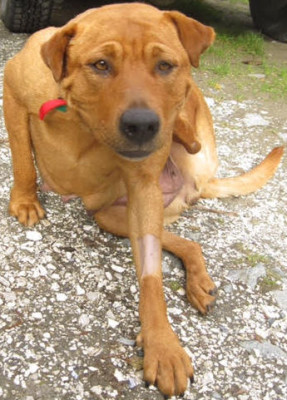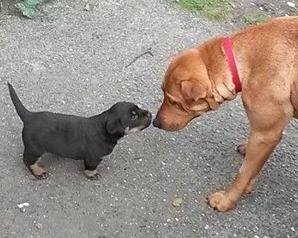Darla in Ahousaht

– by Veronica Gventsadze
On a November morning in the Pacific Northwest Darla wakes to pouring rain. At least it’s dry where she’s taking shelter, and the three children who are with her are warm and well fed. But carrying and raising them is draining her strength, and Darla cannot live such a life for much longer. With some persuasion from a friend she trusts, she has come today to the clinic where her life will be changed.
Darla has the most beautiful eyes, and a quiet dignity about her which some might call shyness. She is gentle and loving, and her many children have grown up to be like her. Perhaps this is why they are so highly prized and why she was left to have many litters of puppies until her owner made the decision to have her spayed. She lives on the Ahousaht First Nations reserve on Flores island off the Pacific coast, a place of rare and wild natural beauty. The very idea of owning and keeping animals is alien to people who had a deep bond with nature before the advent of the white man, but it is here to stay, and the way the Ahousaht community relate to the animals in their care is changing. There is a growing understanding that dogs and cats are as vulnerable as people, not part of wild nature that must be left alone to follow its wisdom. Only a few days before the Canadian Animal Assistance Team arrived in Ahousaht for its animal health clinic, Darla’s owner was one of the first to come to the rescue of the passengers and crew of the whale watching boat “Leviathan” that capsized not far from Flores island. The community felt deep grief for those who perished and joy for the lives saved. Life here is tough, and precious.
Darla’s day at the clinic begins with an exam to make sure she is strong enough to undergo surgery. Next she is given an injection to make her drowsy and prevent pain before it is sparked off, but as the vigilant mother she is, she resists going to sleep. The drugs win, and sleep gets the better of her. A swatch on her arm is shaved to put in an intravenous catheter, a portal through which she will receive fluids to keep her blood pressure from dropping during surgery. But first it is used for induction, an injection that makes her completely unconscious and unable to feel the surgeon’s instruments as they change her inside. A tube is placed in her windpipe to make sure she has an airway and to deliver oxygen should she need it. Her belly is carefully cut open and her ovaries and uterus removed after the blood vessels that feed them are tied off. She is closed up, and taken to the recovery area where she will be watched as she slowly comes awake. An injection of pain medication is given to keep her comfortable for the next 24 hours, after which she will take this medicine in her food. Her puppies, the last of the children she will raise, were napping blissfully while she went through her transformation. As soon as she is able to get up, she is reunited with them, and her relief is obvious. She stands while they nurse, then watches over them as they eat solid food with ravenous gusto. All four settle into a siesta, the pups to sleep off their lunch and Darla to sleep off her anesthetic. Her remarkably loud snoring is her only unladylike quality.
Late in the afternoon Darla and her pups are taken to the home where she will recover and continue to raise them in warmth of every kind. The first part of her life was spent caring for her children and trusting people to do right by her. People have come through for her, and it is her turn to be loved.

